

SEPTEMBER • VOL. 9• SERIES OF 2021
INSIGHTS is a monthly publication of BDB LAW to inform, update and provide perspectives to our clients and readers on significant tax-related court decisions and regulatory issuances (includes BIR, SEC, BSP, and various government agencies).

DISCLAIMER: The contents of this Insights are summaries of selected issuances from various government agencies, Court decisions, and articles written by our experts. They are intended for guidance only and as such should not be regarded as a substitute for professional advice.
Copyright © 2021 by Du-Baladad and Associates (BDB Law). All rights reserved. No part of this issue covered by this copyright may be produced and/or used in any form or by any means – graphic, electronic, and mechanical without the written permission of the publisher.
What's Inside ...
- HIGHLIGHTS FOR AUGUST 2021
- SIGNIFICANT COURT DECISIONS
- Supreme Court
- SIGNIFICANT REGULATORY ISSUANCES
- Bureau of Internal Revenue
- Securities And Exchange Commission
- Bangko Sentral Ng Pilipinas
- Insurance Commission
- PUBLISHED ARTICLE
- Donor’s tax on renunciation of inheritance
- OUR EXPERTS
- The Personalities
- The Personalities


HIGHLIGHTS for SEPTEMBER 2021
SUPREME COURT DECISIONS
- The decisions of the lower and appellate courts do not constitute a precedent and do not bind the SC or the public. The taxpayer cannot also rely on BIR issuances that were not issued in its favor. (CIR v. South Premiere Power Corp., G.R. Nos. 252627 and 252630, June 16, 2021)
BIR ISSUANCES
- RR No. 16-2021, August 3, 2021 - The soft copies of BIR Form Nos. 2307 and 2316 must be stored and submitted using the file format and naming conventions prescribed under the available modes or submission facilities of the BIR and in accordance with the revenue issuances governing the selected modes or submission facilities of the BIR.
- RR No. 17-2021, August 3, 2021 - The availment of the estate tax amnesty is extended until June 14, 2023. Further amendments to RR No. 6-2019 were introduced.
- RMC No. 91-2021, August 3, 2021 - This provides the guidelines in the filing of returns and payment of taxes and submission of reports and attachments falling within the period from August 6, 2021 to August 20, 2021, for taxpayers under ECQ and MECQ.
- RMC No. 92-2021, August 9, 2021 - This extends the deadline for filing of position papers, replies, protests, documents and other similar letters and correspondences in relation to the ongoing BIR audit investigation and filing of VAT Refund falling due during the ECQ and MECQ period, including extensions thereof.
- RMC No. 93-2021, August 9, 2021 - This suspends the running of the statute of limitations on assessment and collection of taxes due to the declaration of ECQ and MECQ in NCR and other areas of the country
- RMC No. 94-2021, August 10, 2021 – This clarifies the computation of donor's tax in case the heir waives/renounces his share from the specific property forming part of the estate of the decedent.
- RMC No. 97-2021, August 16, 2021 – This clarifies the tax obligations of all social media influencers.
SEC ISSUANCES
- SEC Notice, August 17, 2021 – No mandatory grace period will be granted for the payment of loans and/or interest falling due during the ECQ period, which is from August 6, 2021to August 20, 2021.
BSP ISSUANCES
- BSP M-2021-046, August 19, 2021 – This informs the closure of the application window for new digital banks, including converting banks, starting August 31, 2021.
IC ISSUANCES
- IC ICR No. 2021-04, August 6, 2021 – Sale of e-vouchers on Shopee, Lazada, and other online-selling platforms is allowed..

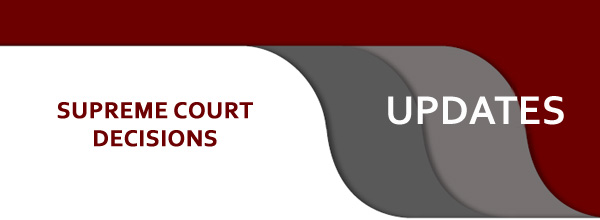
The decisions of the lower and appellate courts do not constitute a precedent and do not bind the SC or the public. The taxpayer cannot also rely on BIR issuances that were not issued in its favor.
Taxpayer paid deficiency DST plus surcharge, interest, and compromise penalty under protest. Subsequently, taxpayer instituted an administrative claim for refund or issuance of tax credit certificate in the same amount. The BIR failed to act on the application; hence, taxpayer filed a petition for review before the lower court which partly granted the claim. The lower court held that the deficiency DST paid is not a tax that has been erroneously or illegally collected but the taxpayer is not liable for surcharge, interest, and penalty since it merely relied in good faith on existing court decisions and BIR rulings that inter-company loans and advances covered by inter-office memoranda were not loan agreements subject to DST. The CTA EB adopted the findings and conclusions of the lower court.
The Supreme Court (SC) held that good faith and mistaken reliance on decisions of the CTA declaring inter-company loans and advances covered by inter-office memoranda not subject to DST could not excuse the taxpayer from the civil penalties. The decisions of the lower and appellate courts do not constitute a precedent and do not bind the SC or the public. The taxpayer cannot also rely on BIR issuances that were not issued in its favor. In this case, the taxpayer did not secure a favorable ruling from the BIR that would categorically state or pronounce that its loan agreements or intercompany advances for taxable year 2010 are not subject to DST. However, the compromise penalty could not be imposed on the taxpayer since a compromise is, by its nature, mutual in essence. The payment made under protest by the taxpayer signifies that no agreement had been reached between the parties. (CIR v. South Premiere Power Corp., G.R. Nos. 252627 and 252630, June 16, 2021)

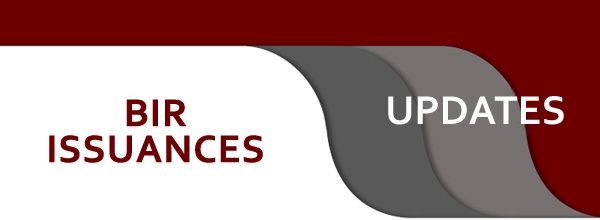
RR No. 16-2021, August 3, 2021
This further amends the pertinent provisions of RR No. 2-2006 and No. 11-2013, as amended by RR No. 2-2015, with respect to the manner of submission of copies of BIR Form Nos. 2307 and 2316.
The soft copies of the said forms must be stored and submitted using the file format and naming conventions prescribed under the available modes or submission facilities of the BIR and in accordance with the revenue issuances governing the selected modes or submission facilities of the BIR.
RR No. 17-2021, August 3, 2021.
The availment of the estate tax amnesty is extended until June 14, 2023. The following amendments to RR No. 6-2019 were also introduced:
1. Proof of settlement of the estate, whether judicial or extra-judicial (e.g., Extra-judicial Settlement of Estate, copy of court order), need not accompany the Estate Tax Amnesty Return (ETAR) if it is not yet available at the time of its filing, but no eCAR shall be issued unless such proof is presented and submitted to the concerned RDO.
2. In the event that the proof of estate settlement includes properties not indicated in the ETAR filed, the particular properties shall likewise be excluded from the eCAR, unless additional estate tax amnesty payment shall be made if the submission is within the amnesty period. Otherwise, the additional estate tax to be paid for the additional properties indicated shall be subject to applicable estate tax rate, including interests and penalties.
3. One eCAR shall be issued per real property, including the improvements, only until such time that the eCAR system is capable of generating one eCAR for all properties covered by a single transaction.
RMC No. 91-2021, August 3, 2021.
This provides the guidelines in the filing of returns and payment of the corresponding taxes due thereon, and submission of reports and attachments falling within the period from August 6, 2021 to August 20, 2021, for taxpayers falling under jurisdiction declared as ECQ and MECQ.
The deadlines for filing and payment and submission are extended for a period of 15 calendar days from August 20, 2021. However, if the ECQ and/or MECQ will be extended, the filing and payment and submission of reports and attachments falling within the period shall also be extended by 15 calendar days from the lifting of the ECQ and/or MECQ.
Taxpayers during the said period may:
1. Pay internal revenue taxes at the nearest AABs notwithstanding RDO jurisdiction;
2. File and pay the corresponding tax due at the concerned Revenue Collection Officers of the nearest RDO, even in areas where there are AABs.
3. Pay taxes through online payment facilities.
If the extended deadline falls on a non-working holiday or a holiday, the same shall be on the next working day.
RMC No. 92-2021, August 9, 2021.
This extends the deadline for filing of position papers, replies, protests, documents and other similar letters and correspondences in relation to the ongoing BIR audit investigation and filing of VAT Refund with the VAT Credit Audit Division (VCAD) falling due during the ECQ and MECQ period, including extensions thereof, for taxpayers registered with the RDOs in areas covered by ECQ and MECQ declaration or for registered taxpayers filing the said papers, letters and documents with the appropriate BIR offices located in areas covered by ECQ and MECQ declarations. The extension is as follows:
| Letter/Correspondence | Extended Deadline |
| Position Paper and Supporting Documents in Response to Notice of Discrepancy |
30 days from lifting of the ECQ and/or MECQ |
| Reply and Supporting Documents in Response to the Preliminary Assessment Notice (PAN) |
15 days from lifting of the ECQ and/or MECQ |
| Protest Letter in Response to the Final Assessment Notice/Formal Letter of Demand (FAN/FLD) |
30 days from lifting of the ECQ and/or MECQ |
| Transmittal Letter and Supporting Documents in relation to Request for Reinvestigation |
30 days from lifting of the ECQ and/or MECQ |
| Request for Reconsideration to the Commissioner of Internal Revenue (CIR) on Final Decision on Disputed Assessment (FDDA) |
30 days from lifting of the ECQ and/or MECQ |
| Submission of Documents in Response to Subpoena Duces Tecum |
15 days from lifting of the ECQ and/or MECQ |
| Submission of Documents in relation to First, Second, and Final Notice |
10 days from lifting of the ECQ and/or MECQ |
| Other Similar Letters and Correspondences | 30 days from lifting of the ECQ and/or MECQ |
| Filing of VAT Refund with VCAD | 30 days from lifting of the ECQ and/or MECQ |
In case of any future declarations of ECQ and/or MECQ by the government on any area/s of the country, thereby restricting movement in the said area/s, the deadline of submission of the aforementioned papers, letters and documents falling within the ECQ and/or MECQ period shall likewise be extended, following the extended deadlines identified above.
Further, face-to-face meetings of BIR officials and employees with taxpayers and/or their authorized representatives in the areas covered by ECQ and MECQ declarations are deferred and re-scheduled until the lifting of ECQ and/or MECQ or any future declarations thereof.
RMC No. 93-2021, August 9, 2021.
This suspends the running of the statute of limitations on assessment and collection of taxes pursuant to Section 223 of the Tax Code, due to the declaration of ECQ and MECQ in the NCR and other areas of the country.
The running of the statute of limitations for assessment and collection of deficiency taxes is suspended in the affected jurisdictions while the ECQ and/or MECQ is in effect, including any extension/s thereof, and for 60 days thereafter. This suspension applies to the issuance and service of assessment notices, warrants and enforcement, and/or collection of deficiency taxes.
In case of any future declarations of ECQ and/or MECQ by the government on any area/s of the country, thereby restricting movement in the said area/s and effectively barring the service of assessment notices, personally or by substituted service, and Warrants of Distraint and or Levy, as well as Warrants of Garnishment, to enforce collection of deficiency taxes, the running of the statute of limitations for assessment and collection of deficiency taxes shall likewise be suspended in the affected jurisdictions during ECQ and/or MECQ, and for 60 days thereafter.
RMC No. 94-2021, August 10, 2021.
This clarifies the computation of donor's tax in case the heir waives/renounces his share from the specific property forming part of the estate of the decedent.
General renunciation of an heir on his/her share from the inheritance is not subject to donor’s tax. However, there are instances, where in the settlement of the estate of the decedent, instead of all the heirs receiving their respective shares in all the properties of the decedent, the heirs will agree among themselves for a specific property that each one of them will receive.
In this scenario, there will be an heir who will receive a share lower or higher than the value of what should have been his rightful share in all the properties of the decedent. In this case, there is actually a partial renunciation of inheritance since the heir is waiving his share to only identified properties but not to the entire properties of the decedent.
Hence, donor’s tax shall be imposed on the value forgone as a result of such waiver/renunciation.
RMC No. 97-2021,
August 16, 2021.
This clarifies the tax obligations of all social media influencers.
Social media influencers include all taxpayers, individuals or corporations, receiving income, in cash or in kind, from any social media sites and platforms (YouTube, Facebook, Instagram, Twitter, TikTok, Reddit, Snapchat, etc.) in exchange for services performed as bloggers, video bloggers, or “vloggers” or as an influencer, in general, and from any other activities performed on such social media sites and platforms.
Unless otherwise exempted, they are liable to income tax and business tax (percentage tax or VAT) pursuant to the provisions of the Tax Code and other existing laws.
Income Tax
- They are taxable on all income derived from sources within and without the Philippines, if they are citizens of the Philippines residing therein, and domestic corporations. They are taxable on income derived from sources within the Philippines if they are non-resident citizens or resident and non-resident aliens and resident foreign corporations.
- They are, if other than corporations and partnerships, classified for tax purposes as self-employed individuals or persons engaged in trade or business as sole proprietors. As such, their income is generally considered as business income.
- The payments received by a social media influencer in consideration for services rendered or to be rendered, irrespective of the manner or form of payment constitute gains or profits from the conduct of trade or business. Thus, if a social media influencer receives free products in exchange for the promotion thereof on his/her/it YouTube channel or other social media accounts, he/she/it must declare the fair market value of such products as income.
- Except for certain passive income derived from sources within the Philippines, capital gains from the sale of shares not traded in the stock exchange and from the sale of real property classified as capital assets, income tax shall be imposed on the taxable income of resident citizens, aliens, partnerships, domestic and resident foreign corporations doing business as a social media influencer and shall be based on the schedular income tax rates for individuals or on the corporate income tax rate, as the case may be. Royalty income from another country, including payments under the YouTube Partner Program, shall likewise be included in the computation of his/her/its gross income.
- For resident aliens, any income derived from Philippine-based contents shall generally be taxable. Thus, the burden of proof that the income was derived from sources without the Philippines lies upon the resident alien. Absent such proof, the income will be assumed to have been derived from sources within the Philippines.
Business Tax
- Self-employed individuals whose gross sales or gross receipts and other non-operating income do not exceed the VAT threshold of ₱3,000,000.00 shall have the option to avail of the 8% tax on gross sales or gross receipts and other non-operating income in excess of ₱250,000 in lieu of the graduated income tax rates and percentage tax under Section 116 of the Tax Code.
- Mixed income earners or those who are earning both compensation income and income from business and/or profession shall be taxable for all income earned from compensation and income earned from business or practice of profession, which may be taxed at the same graduated rates or 8% income tax based on gross sales or gross receipts, provided that the total gross sales and/or gross receipts and other non-operating income do not exceed the VAT threshold. Otherwise, the graduated rates shall apply and they shall likewise be liable for VAT.
In computing taxable income subject to income tax, deductions from gross income shall be allowed for all the ordinary and necessary expenses paid or incurred during the taxable year in carrying on or which are directly attributable to the development, management, operation and/or conduct of the trade, business or exercise of a profession. These expenses constitute the itemized deductions which may be claimed as deductions, provided that they are directly and exclusively related to the production or realization of the income and can be substantiated with sufficient evidence, such as BIR-registered receipts and invoices.
However, in lieu of the itemized deductions, the taxpayer may elect Optional Standard Deduction (OSD) or a standard deduction not exceeding 40% of gross sales/receipts in the case of individual taxpayers, or 40% of its gross income in the case of corporations. No substantiation is required for the OSD. To be entitled to OSD, the taxpayer must signify in the return the intention to elect OSD, otherwise, he/she/it shall be considered as having availed of the itemized deductions.
Likewise, they are required to register with the BIR, keep books of accounts and file returns and pay the corresponding taxes. They are also subject to the withholding VAT system of the BIR, wherein they are required to withhold on certain income payments subject to withholding taxes.
Those who wilfully attempts to evade the payment of tax or wilfully fails to make a return, to supply accurate and correct information or to pay tax shall, in addition to the payment of taxes and corresponding penalties, be liable criminally liable under the Tax Code.
A substantial under-declaration of taxable sales, receipts or income, or a substantial overstatement of deductions shall constitute prima facie evidence of a false or fraudulent return, and failure to report sales, receipts or income in an amount exceeding 30% of that declared per return, and a claim of deductions in an amount exceeding 30% of actual deductions shall render the taxpayer liable for substantial under-declaration of sales, receipts or income or for overstatement of deductions.
Note: The tax obligations discussed above are not entirely new. The BIR just reminded every person liable to tax, including the social media influencers, to comply with their tax obligations.


SEC Notice, August 17, 2021
No mandatory grace period will be granted for the payment of loans and/or interest falling due during the ECQ period, which is from August 6, 2021 to 20, 2021.
Nevertheless, the SEC still strongly encourages financing companies (FCs), lending companies (LCs), and Accredited Microfinance Non-government Organizations (MF-NGOs) to continue implementing debt relief measures that will help ease their borrowers’ financial burden, taking into consideration the adverse impact of the COVID-19 pandemic to the borrowing public, and based on the continuing assessment of their cash flows. FCs, LCs, and Accredited MF-NGOs may also develop and implement their own programs or schemes that will provide financial relief to their borrowers. Financial relief requests shall be directed to the concerned FCs, LCs, or Accredited MF-NGOs.

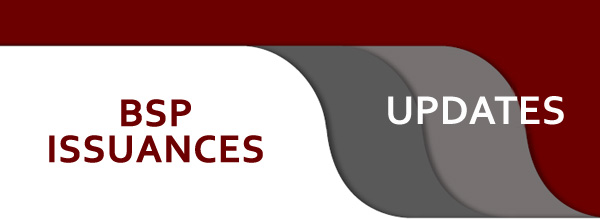
BSP M-2021-046, August 19, 2021
The Monetary Board, in its Resolution No. 1064 dated August 12, 2021, approved the closure of the application window for new digital banks, including converting banks, starting August 31, 2021.
The digital bank applications received by the BSP until August 31, 2021 will be processed on a first-come, first-served basis and will be assessed for completeness and sufficiency of documentation or information submitted as well as compliance with the licensing criteria on the establishment of digital banks.
Applications that are received by August 31, 2021 with noted deficiencies in documentary and/or licensing criteria will be returned and considered closed. The BS will no longer accept nor entertain new and returned applications after August 31, 2021.
reports, when warranted.

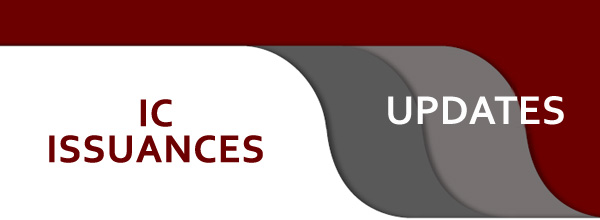
IC ICR No. 2021-04, August 6, 2021
The Insurance Commission interposed no objection to the intended selling of e-vouchers. As such, an insurance company may sell e-vouchers on Shopee, Lazada, and other online-selling platforms, provided that such sale does not amount to discounting or rebating, in accordance with Section 370 of the Insurance Code, as amended. Hence, the value of the subject e-vouchers must be the peso equivalent of the amount paid by the user for the same.
Finally, Pru Life UK is enjoined to ensure compliance with Sections 5 to 9 of CL 2020-70, which provides the framework for digital payments as an integral part of insurance technology, as well as other pertinent laws, rules and regulations implemented by other government regulatory agencies.
.

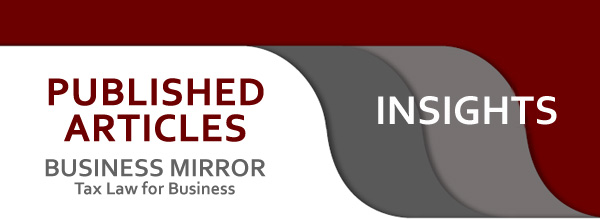
Donor’s tax on renunciation of inheritance
By Atty. Rodel C. Unciano
Under the Civil Code, donation is defined as an act of liberality whereby a person disposes gratuitously of a thing or right in favor of another, who accepts it. A gift or a donation, in order to be considered as one, should be made as an act of liberality or without any consideration or compensation being received in exchange therefor. A donation has been said to have the following essential elements: 1) the reduction of the patrimony of the donor; 2 the increase in the patrimony of the donee; and 3) the intent to do an act of liberality or animus donandi.
In taxation, liberality of a person is not at all free. The taxman is always under your watch irrespective of your liberality. Under the Tax Code, donor’s tax is levied, assessed, collected and paid upon the transfer by any person, resident or nonresident, of the property by gift. The tax shall apply whether the transfer is in trust or otherwise, whether the gift is direct or indirect, and whether the property is real or personal, tangible or intangible. Donor’s tax is also imposed on the transfer of property, except real properties classified as capital assets, if the transfer is made for less than an adequate and full consideration in money or money’s worth.
Under Revenue Regulations (RR) 12-2018, renunciation by the surviving spouse of his/her share in the conjugal partnership or absolute community after the dissolution of the marriage in favor of the heirs of the deceased spouse or any other person/s is likewise subject to donor’s tax.
There’s a new item that the Bureau of Internal Revenue (BIR) is now considering as subject to donor’s tax. In Revenue Memorandum Circular (RMC) 94-2021, the BIR clarified that in case the heir waives or renounces his share from the specific property forming part of the estate of the decedent, donor’s tax shall likewise be imposed on the value forgone as a result of such waiver or renunciation.
According to the circular, general renunciation of an heir of his share from the inheritance is not subject to donor’s tax. This is consistent with Section 12 of RR 12-2018 which provides that the general renunciation by an heir, including the surviving spouse, of his/her share in the hereditary estate left by the decedent is not subject to donor’s tax, unless specifically and categorically done in favor of identified heir/s to the exclusion or disadvantage of the other co-heirs in the hereditary estate.
In the settlement of the estate of a deceased person, it is common for the heirs to agree among themselves for a specific property that each one of them will receive. This will result to a situation where an heir could be receiving a share lower or higher than the value of what should have been his rightful share in all the properties of the decedent, following the rules on succession under the Civil Code.
RMC 94-2021 clarified that in in this case, there is actually a partial renunciation of inheritance since the heir is waiving his share to only identified properties but not to the entire properties of the decedent. Hence, donor's tax shall be imposed on the value forgone as a result of such waiver/renunciation.
----------------------------------------------
For inquiries on the article, you may call or email
ATTY. RODEL C. UNCIANO
Partner
T: +63 2 8403-2001 local 140
This email address is being protected from spambots. You need JavaScript enabled to view it.



DISCLAIMER: The contents of this Insights are summaries of selected issuances from various government agencies, Court decisions and articles written by our experts. They are intended for guidance only and as such should not be regarded as a substitute for professional advice.
Copyright © 2021 by Du-Baladad and Associates (BDB Law). All rights reserved. No part of this issue covered by this copyright may be produced and/or used in any form or by any means – graphic, electronic and mechanical without the written permission of the publisher.





